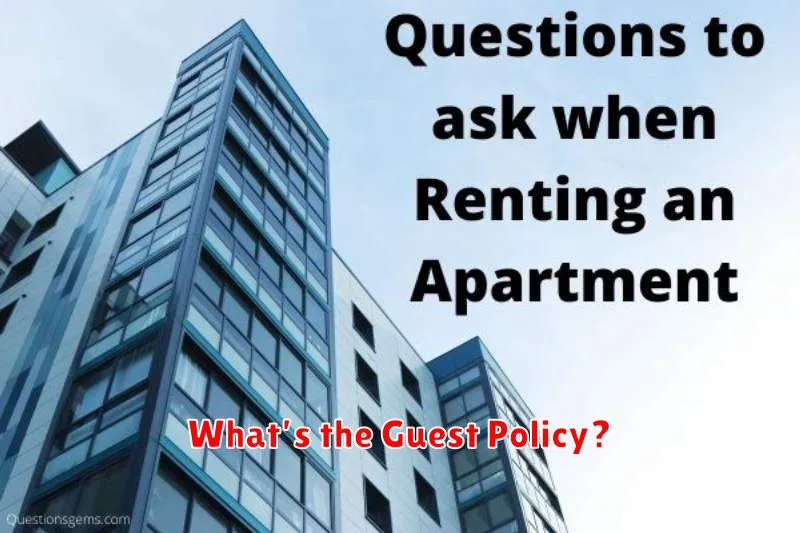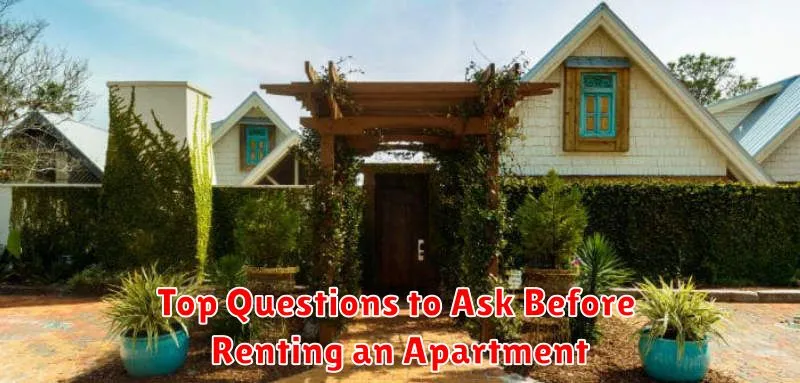Finding the perfect apartment can feel like searching for a needle in a haystack. Before you sign a lease and commit to a new home, it’s crucial to ask the right questions. This will not only help you avoid potential problems down the road but also ensure you find a place that truly meets your needs and budget. This article outlines the top questions to ask before renting an apartment, covering everything from lease terms and pet policies to parking availability and maintenance responsibilities. Understanding these key factors will empower you to make an informed decision and secure the ideal rental.
Renting an apartment is a significant commitment, both financially and personally. Don’t rush the process. Take the time to thoroughly investigate potential properties and gather all the necessary information. By asking the right questions upfront, you can avoid future headaches and ensure a positive renting experience. From clarifying utility costs and security deposits to understanding guest policies and building security, this comprehensive guide will equip you with the knowledge you need to confidently navigate the apartment hunting process and find the perfect place to call home.
What’s Included in the Rent?
Understanding what your monthly rent payment covers is crucial. Ask your potential landlord for a clear breakdown of included amenities.
Common inclusions are:
- Utilities: Does the rent cover water, gas, electricity, trash removal, or internet/cable?
- Parking: Is a parking spot included, and if so, is it assigned or open? Are there additional fees for guest parking?
- Amenities: Are amenities such as laundry facilities, gym access, or a pool included?
Knowing precisely what is included in your rent will help you accurately budget and avoid unexpected expenses.
Are Utilities Separate?
Understanding utility responsibilities is crucial. Utility costs can significantly impact your monthly budget. Be sure to inquire whether utilities are included in the rent or if they are separate.
Ask which utilities are your responsibility. Common separate utilities include electricity, gas, water, sewer, and trash removal. Some apartments may include certain utilities in the rent while others are billed separately. Clarify this upfront to avoid surprises later.
If utilities are separate, inquire about average monthly costs. This will help you accurately estimate your total monthly expenses. Also, ask how these utilities are billed—individually or through the landlord.
How Long Is the Lease?
Lease length is a critical factor to consider. Most leases are for 12 months, but some landlords offer shorter or longer terms. A shorter lease provides more flexibility, while a longer lease offers stability.
Carefully consider your needs and plans before committing to a lease term. If you’re unsure about your future plans, a shorter lease might be a better option, even if it comes at a slightly higher monthly rent.
Be sure to ask about the consequences of breaking the lease early, such as penalties or fees.
What’s the Guest Policy?

Before signing a lease, it’s crucial to understand the landlord’s policy on guests. Ask about any restrictions regarding the duration of visits, overnight guests, and the maximum number of guests allowed at any given time.
Some buildings have strict rules about guests, particularly concerning overnight stays. Understanding these rules upfront prevents potential conflicts or lease violations in the future. Clarify whether there are designated guest parking areas, and if there are any associated fees.
Are Pets Allowed?
If you have furry, feathered, or scaled family members, finding a pet-friendly apartment is crucial. Inquire about the specific pet policy. Some buildings may allow certain types of pets but not others, have size or breed restrictions, or require pet deposits or monthly fees.
Key questions to ask:
- Are there any breed or size restrictions?
- Is there a pet deposit or monthly pet rent?
- Are there any designated pet areas on the property?
What Is the Security Deposit?
A security deposit is a sum of money paid to the landlord at the beginning of a lease term. It acts as insurance against potential damages to the property or unpaid rent. The landlord holds this deposit for the duration of the lease.
Key aspects of the security deposit include its amount, which is often equivalent to one or two months’ rent, and the conditions under which it can be withheld. Landlords are generally required to return the security deposit, less any deductions for damages or unpaid rent, within a specified timeframe after the lease ends.
When Is Rent Due?
Establishing the rent due date is crucial. Ask your potential landlord specifically which day of the month rent is due.
Clarity on this avoids late fees and potential misunderstandings. Confirm if there’s a grace period and how long it is.
Understand the accepted payment methods and whether there are any associated fees.
Is Parking Available?
Parking can be a significant factor when choosing an apartment, especially if you own a car. Inquire about the availability of parking spaces.
Are there designated spots for residents? Is there a fee for parking? If street parking is the only option, is it readily available, or is it competitive and difficult to find a spot?
Understanding the parking situation beforehand can save you a lot of hassle and potential expenses down the road.
What’s the Move-In Process?
Understanding the move-in process is crucial for a smooth transition. Inquire about the specific steps involved. This often includes a pre-move-in inspection, signing the lease agreement, and paying any required deposits and first month’s rent.
Ask about the keys. When and how will you receive them? Will there be a formal key handover process?
Confirm the move-in date and any applicable move-in time restrictions, especially if you are moving into a building with shared spaces or elevators. Knowing these details ahead of time will help you plan your move effectively.
Are There Any Fees?

Beyond the monthly rent, be aware of potential additional costs. Application fees are common, covering background and credit checks. Ask about administrative fees, which can cover lease processing.
Pet fees, both monthly and one-time, are typical in pet-friendly buildings. If parking isn’t included, inquire about parking fees. Some buildings may also charge amenity fees for access to facilities like gyms or pools. Finally, understand the security deposit requirements and any potential move-in/move-out fees.

